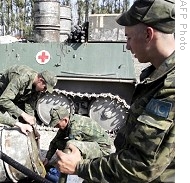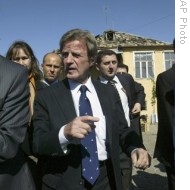VOA标准英语10月-Russian Troops Withdraw from Georgia, But Is It E(在线收听)
Russian soldiers still man the Akhalgori checkpoint - a half dozen men are visible behind concrete barriers - the Russian flag flies above a hut by the side of the road.
They say they're not authorized to speak to reporters, but they say that so far they've received no orders to pull back further.
Just 400 meters back down the road, a dozen Georgian police have their own checkpoint. They watch the Russians closely. On this occasion, a European Union monitoring patrol has pulled up.
 |
| Russian peacekeeping forces gather supplies while dismantling Karaleti checkpoint, 08 Oct 2008 |
Patrol leader Fredrik Nylyn talked with the Georgian commander about the situation. "We'll go over and speak to the Russian side as usual and maybe we'll drive over the bridge to the Russian watch-post on the other side as well."
Nylyn is part of a European contingent sent to monitor the situation after an EU-backed cease-fire agreement halted clashes between Russian and Georgian forces in August.
He said, "The Georgians [are] on one side with their checkpoint and we have a Russian checkpoint just 400 meters north of the place where we are standing right now."
At the heart of the conflict are the breakaway regions of South Ossetia and Abkhazia. The war in August was sparked when Georgian forces launched an attack against South Ossetia's capital Tskhinvali to try to rein in Russian-backed separatists and regain control of the area. Russian forces responded quickly, driving the Georgians back, moving deep into Georgia and creating buffer zones around the breakaway regions.
Under the cease-fire accord Moscow promised to withdraw by October 10th.
In Brussels, the EU's foreign policy chief, Javier Solana, said monitors confirmed the Russian withdrawal and he welcomed the pull-out.
 |
| French Foreign Minister Bernard Kouchner, center, during a visit to the town of Tkviavi in Georgia, 10 Oct 2008 |
But during a visit Friday to the Georgian town of Gori, French Foreign Minister Bernard Kouchner was not so sure. He described the Russian withdrawal as a first step - it's not complete, he said.
Kouchner also visited damaged homes in the buffer zone near South Ossetia including a police station that had been taken over by Russian and South Ossetian militias.
He said, "The Russians themselves or the militia [were here], and they destroyed everything."
Georgia said Russia has not complied with the cease-fire accord because it still maintains forces inside South Ossetia and Abkhazia. Russia said it has complied because its forces pulled out of the buffer zones.
These differing views are no surprise, said EU patrol leader Fredrik Nylyn. "It's one thing to draw a line on a map but it's another being out in the environment and trying to establish where is that line now. So, there is room for different interpretations there - for both sides actually," he said.
Russia, which unilaterally recognized the independence of both breakaway republics says it will maintain troops in Abkhazia and South Ossetia to guard against future Georgian attacks.